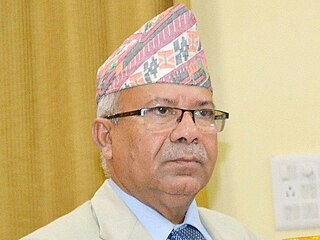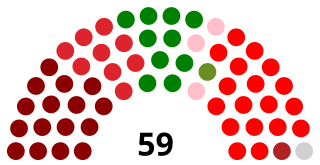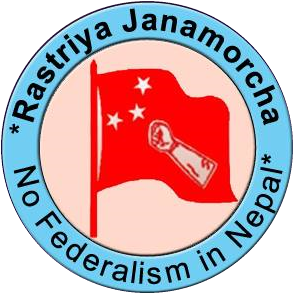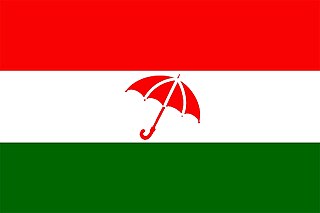Related Research Articles

Sher Bahadur Deuba is a Nepali politician serving as the prime minister of Nepal since 13 July 2021. He has also been serving as the president of the Nepali Congress since 2016. Deuba has previously served four terms as the prime minister and is the Member of Parliament for the parliamentary constituency of Dadeldhura 1.

There are three types of elections in Nepal: elections to the Federal Parliament, elections to the provincial assemblies and elections to the local government. Within each of these categories there may be by-elections as well as general elections. Currently three electoral systems are used: parallel voting for House of Representatives and provincial assemblies, Single transferable vote for National Assembly and first past the post for local elections.

Madhav Kumar Nepal, is a Nepalese politician and former Prime Minister of Nepal. He served as Prime Minister of Nepal from 25 May 2009 to 6 February 2011 for nearly two years.

The National Assembly or Rastriya Sabha is one of the houses of the Federal Parliament of Nepal, the other house being the House of Representatives. The composition and powers of the Assembly are established by Part 8 and 9 of the Constitution of Nepal. There are a total of 59 members: 8 members are elected from each of the seven provinces by an electoral college of each province, and three are appointed by the President on recommendation of the government.

Constituent Assembly elections were held in Nepal on 10 April 2008, having been postponed from earlier dates of 7 June 2007 and 22 November 2007. The Constituent Assembly was planned to draft a new constitution and therefore decide, amongst other things, on the issue of federalism. The number of eligible voters was around 17.5 million. The Constituent Assembly was originally set to have a term of two years.

Rastriya Janamorcha is a political party in Nepal. It was originally founded in 1995 as the legal front of Communist Party of Nepal (Masal). Former Deputy Prime Minister, Chitra Bahdur KC is the chairman of the party.

Dr. Ram Baran Yadav is a Nepali politician and physician who served as the first president of Nepal from 23 July 2008 to 29 October 2015, following the declaration of a republic in 2008. Previously he served as Minister of Health from 1999 to 2001 and general secretary of the Nepali Congress.

Amod Prasad Upadhyay is a Nepalese social worker and politician.

Khadga Prasad Sharma Oli is a Nepalese politician and former Prime Minister of Nepal. He served three terms as prime minister from 11 October 2015 to 3 August 2016, from 15 February 2018 to 13 May 2021 as the first elected prime minister under the new constitution, and from 13 May 2021 to 13 July 2021.

Constituent Assembly elections were held in Nepal on 19 November 2013. The vote was repeatedly delayed, having previously been planned for 22 November 2012 following the dissolution of the 1st Constituent Assembly on 27 May 2012, but it was put off by the election commission. The Nepali Congress emerged as the largest party in the 2nd Nepalese Constituent Assembly, winning 196 of the 575 elected seats.
Narayan Khadka is a central member of Nepali Congress who has served as the Foreign minister of Nepal since 2021. He has worked previously as Minister of Urban Development under Sushil Koirala-led government.

The Rastriya Janata Party, Nepal, abbr. RJPN was the fourth-largest political party in Nepal after the Nepali Congress, the Nepal Communist Party and the Samajbadi Party, Nepal. It was formed on 21 April 2017 after the merger of Tarai Madhes Loktantrik Party, led by the Mahantha Thakur, Terai Madhes Sadbhawana Party, led by the Mahendra Raya Yadav, Sadbhavana Party, led by the Rajendra Mahato, Nepal Sadbhawana Party, led by the Anil Kumar Jha, Madhesi Jana Adhikar Forum (Republican), led by Rajkishor Yadav and Rastriya Madhesh Samajwadi Party, led by Sharat Singh Bhandari. The party was founded with the ideology of democratic system.

General elections were held in Nepal in two phases on 26 November and 7 December 2017 to elect the 275 members of the fifth House of Representatives, the lower house of the Federal Parliament of Nepal. The election was held alongside the first provincial elections for the seven provincial assemblies. A political deadlock between the governing Nepali Congress and the winning left-wing coalition over the system used to elect the upper house led to delay in forming the new government. Following the announcement of final result by the Election Commission, K.P. Oli of Communist Party of Nepal was sworn in as Prime Minister on 15 February 2018 by the President according to Article 76 (2) of the constitution. He passed a Motion of Confidence on 11 March 2018 with 208 votes.

The Provincial Assembly is the unicameral legislative assembly for a federal province of Nepal.

Provincial assembly elections were held in Nepal on 26 November and 7 December 2017 along with the legislative elections. 330 seats in the seven newly created provincial assemblies were elected by first-past-the-post voting and 220 by proportional representation. The election was part of Nepal's transformation to a federal republic. Next Election will be held in 2022 unless dissolved earlier without completing the five years term. 2022 Nepalese provincial election will be the second election for provinces after completion of tenure of five years.

The third presidential election of Nepal was held on 13 March 2018. As a new election law was developed and as, due to the Nepalese election in 2017, an electoral college could be established, the election took place three years after the previous presidential elections despite the presidential term of office actually being set at 5 years. The President was elected by an electoral college composed of the members of federal parliament and provincial assemblies. The total number of voters was thus 880, however the 331 members of Federal Parliament have a vote weight of 79, while the 549 members of Provincial Assemblies have a vote weight of 48. In total 862 lawmakers participated in the election leading to a turnout of 97.95%.

The 2022 Nepalese local elections were held on 13 May, 2022 in 6 metropolitan cities, 11 sub-metropolitan cities, 276 municipalities and 460 rural municipalities. These were the second set of local-level elections to be held since the promulgation of the new constitution in 2015. From the local election result Nepali Congress has become the single largest party of Nepal followed by CPN (UML) and Maoist Centre.

The Communist Party of Nepal , abbreviated as CPN is the fourth largest political party in Nepal. Former Prime Minister Madhav Kumar Nepal is the chairman of the party and former Prime Minister Jhala Nath Khanal serves as the senior leader.

Municipal election for Kathmandu took place on 13 May 2022, with all 162 positions up for election across 32 wards. The electorate elected a mayor, a deputy mayor, 32 ward chairs and 128 ward members. An indirect election will also be held to elect five female members and an additional three female members from the Dalit and minority community to the municipal executive.

The Municipal election for Rajbiraj were held in 13 May 2022 to elect a mayor, a deputy mayor, 16 ward chairperson and ward members. All positions are for a period of 5 years. A secondary election is to be held for the municipal executives which will elect 5 women from the elected ward members and 3 members who must be from the Dalit and minority community. The electorate for this election will be the 82 members chosen by direct election. Janata Samajwadi Party mayoral candidate Bhimraj Yadav was elected as a Mayor of Rajbiraj by securing 9,624 votes.
References
- ↑ Election Commission of Nepal Archived October 12, 2006, at the Wayback Machine
- ↑ Election Commission of Nepal